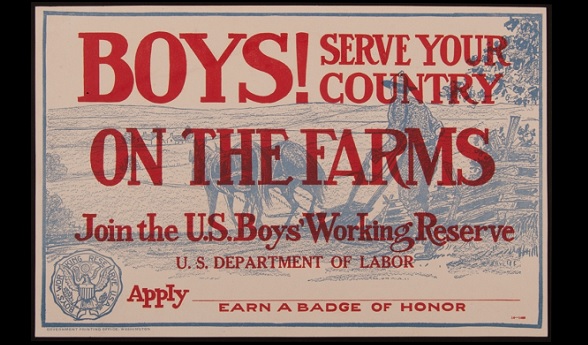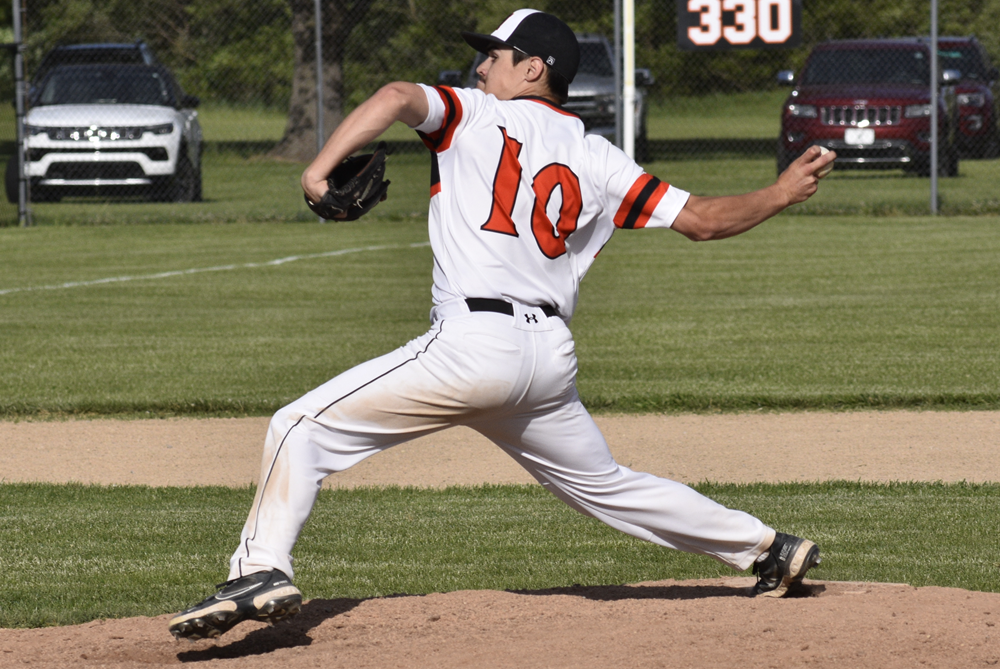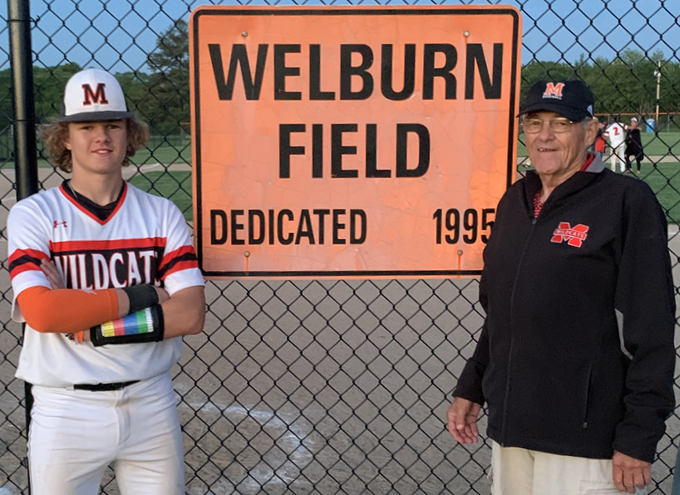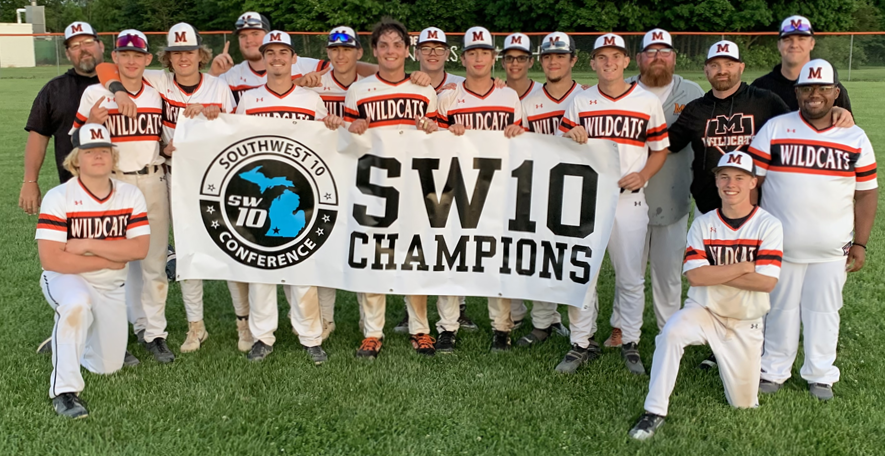
'Over Here,' Athletes Gave to WWI Effort
March 28, 2018
By Ron Pesch
Special for Second Half
In a nation at war, the needs of many outweigh the desires of a few.
Among the many noble sacrifices for the greater good was Michigan’s spring high school sports season of 1918.
The United States’ entry into “The Great War” (today commonly known as World War I) came on April 6, 1917, 2½ years after the war had begun. First elected President of the United States in 1912, Woodrow Wilson earned re-election in 1916 under a platform to keep the U.S. out of the war in Europe. The sinking of the British passenger ships Arabic and Lusitania in 1915 caused the death of 131 America citizens, but did not invoke entry into the conflict. However, continued aggressive German actions forced a reversal in policy.
“The present German submarine warfare against commerce is a warfare against mankind,” stated Wilson in an April 2 special session of Congress, in requesting action to enter the war.
A huge baseball fan, President Wilson recognized the value of entertainment and athletics during a time of crisis. Major league baseball, America’s pastime, completed a full schedule in 1917. A former president at Princeton University, on May 21, 1917, Wilson addressed the value of school athletics in a letter to the New York Evening Post.
 “I would be sincerely sorry to see the men and boys in our colleges and schools give up their athletic sports and I hope most sincerely that the normal courses of college sports will be continued so far as possible, not only to afford a diversion to the American people in the days to come when we shall no doubt have our share of mental depression, but as a real contribution to the national defense. Our young men must be made physically fit in order that later they may take the place of those who are now of military age and exhibit the vigor and alertness which we are proud to believe to be characteristic of our young men.”
“I would be sincerely sorry to see the men and boys in our colleges and schools give up their athletic sports and I hope most sincerely that the normal courses of college sports will be continued so far as possible, not only to afford a diversion to the American people in the days to come when we shall no doubt have our share of mental depression, but as a real contribution to the national defense. Our young men must be made physically fit in order that later they may take the place of those who are now of military age and exhibit the vigor and alertness which we are proud to believe to be characteristic of our young men.”
Despite the highest of hopes, the requirements and realities of war deeply impacted life in the U.S. soon after.
In February of 1918, a proposal was circulated by Dr. John Remsen Bishop, principal of Detroit Eastern High School and president of the Michigan Interscholastic Athletic Association, to abolish spring athletics at Michigan high schools. Due to a labor shortage brought on by the war, the states, including Michigan, needed help on farms, harvesting crops from spring until late fall. The action might also affect the football season of 1918.
The Boys’ Working Reserve, a branch of the U.S. Department of Labor, was organized in the spring of 1917 and designed to tap into an underutilized resource to help address that labor deficiency. “Its object was the organization of the boy-power of the nation for work on the farms during the school vacation months.”
While the idea was popular among schools around Detroit, due to the lack of public commentary from outstate school administration, it was expected that the proposal would meet at least some opposition when the M.I.A.A. gathered on Thursday, March 28 in Ann Arbor during a meeting of the state’s Schoolmasters Club.
Less than two weeks prior to the March meeting, Michigan Agricultural College made an announcement that would impact one aspect of the coming spring sports season.
“The department of athletics of the Michigan Agricultural College begs to inform the high schools of the state that plans for the annual interscholastic track meet, which was to have been conducted here in June, have been given up this year – not through any desire on the part of this department to discourage athletics, but because this is a time when we can and should devote our resources to better uses,” said coach Chester L. Brewer of the Aggies to the Lansing State Journal. “It would hardly be sound judgment for us to make our usual elaborate plans for this meet while our government is appealing to all of us to economize and exercise the utmost thrift. Neither is it wise policy to encourage unnecessary traveling upon the railroads, or to ask high schools of the state to make any expenditures other than those which are absolutely necessary.”
Earlier in the year, similar news had come from the University of Michigan.
In January of 1917, the University of Michigan had announced plans for an elaborate annual high school basketball invitational, designed to identify a Class A state champion. Billed as the “First Annual Interscholastic Basket Ball Tournament,” the March event hosted 38 teams. However, influenced by the war, a decision had been made not to run a second tournament in 1918. Instead, on March 27, Kalamazoo Central and Detroit Central, two of the state’s top teams, were invited to Ann Arbor for a hastily arranged contest at U-M’s Waterman Gymnasium. The schools had split a two-game series during the regular season. Kalamazoo won the season’s third matchup, and while not official, declared itself 1918 Michigan state champion.
Into this environment of patriotism and uncertainty, school administrators arrived in Ann Arbor for the Schoolmasters gathering. There, in the morning, the membership heard a presentation from H. W. Wells, assistant and first director of the Boys’ Working Reserve. “The heart of the nation, rather than the hearts of the nation, is beginning to beat. War is making us a unit,” said Wells, discussing the aim to recruit boys between the ages of 16 and 21 to help provide food for the allies in Europe and at home in the United States.
 “Wells told of the need for the farmers to sow more wheat, and plant more corn,” reported the Ann Arbor News, “and in the same breath he told of great corn fields all over the country, where last year’s corn still lay unhusked, because of a lack of farm labor.”
“Wells told of the need for the farmers to sow more wheat, and plant more corn,” reported the Ann Arbor News, “and in the same breath he told of great corn fields all over the country, where last year’s corn still lay unhusked, because of a lack of farm labor.”
It was estimated that 25 percent of the nation’s farm workforce was now active in the armed forces.
The proposition was brought to the M.I.A.A. by Lewis L. Forsythe, principal at Ann Arbor High School, who would soon establish himself as a guiding force in high school athletics. The proposal “was discussed thoroughly.”
“This session is usually a stormy one, because of contentions that arise over rulings that affect schools in different ways,” said Adrian superintendent Carl H. Griffey to the Adrian Daily Telegram, “but this meeting was a serious one in which all matters were related to our national welfare and passed by unanimous votes.”
So, one day after the conclusion of the abbreviated state basketball championship contest, the spring prep sports season in Michigan came to an abrupt halt. Michigan’s male high school students were asked to work to support the war effort.
“Chances are that they will remain there for the duration of the war,” stated the Lansing State Journal in response to the action. “At the meeting … it was talked of quitting football because of the need of the boys staying on the farms till the latter part of November. This is highly probable. If it is passed upon then Michigan high schools will have but one sport, basketball.
“Whether intra-mural sports will replace the representative teams is not known. This form of athletics demands the attention of a great number of teachers to tutor the different class organizations. The teachers are taxed to the limit at present and cannot give the time to sports. Organizing farm classes and Liberty bond teams is taking the teacher’s spare moments. … But still athletics are needed, as the war has demonstrated, and physical training should be instituted from the kindergarten to the university.“
“Those lads who leave for the farms the first of May,” wrote the Port Huron Times-Herald, “will be in better condition when they return home from the fields and cow lanes than they would (have) had they remained in the city until June batting the leather pill.”
The fate of the 1918 football season would not be known until late August.
In late June, the 29th Governor of Michigan, Albert E. Sleeper, thanked the estimated 8,000 students who had joined the ranks.
 “To you soldiers of the soil I would say this, that I am as proud to address you as I would be to address any of the boys who are bearing arms for their country. You have proved that you are true patriots, for you have started out to do exactly what your country has asked you to do – the thing which you can do best for your country at this time.
“To you soldiers of the soil I would say this, that I am as proud to address you as I would be to address any of the boys who are bearing arms for their country. You have proved that you are true patriots, for you have started out to do exactly what your country has asked you to do – the thing which you can do best for your country at this time.
“Every day, in the rush of official work, I think of you Reservists as you work on the farms, just as I think of our soldiers who are in training camps or ‘over there.’ And I am just as proud of you as I am of them. So are all the people of Michigan.”
It was estimated “the boys who last spring left their high school studies and as members of the United States Boys’ Reserve have helped the Michigan division to add $7,000,000 to the food production of the nation.”
In September, Byron J. Rivett, secretary of the M.I.A.A., announced that, based on a vote of member high schools, prep sports would be resumed in the fall. The Detroit News celebrated the news that “moleskins and pigskins will be in evidence and the grand old game will be a part of the autumn’s entertainment.”
In October, in Grand Rapids and Detroit and other cities across the state, officials gathered to honor those who served as part of the “Michigan Division of the Reserve” and to award bronze badges in recognition for their contribution to the war effort.
World War I officially ended on November 11 with the signing of the armistice. Armistice Day, today known as Veteran’s Day, was first celebrated in 1919. In total, an estimated 16 million were killed during the war.
“Four million ‘Doughboys’ had served in the United States Army with the American Expeditionary Forces (AEF). Half of those participated overseas,” said Mitchell Yockelson in Prologue magazine, a publication of the National Archive. “Although the United States participated in the conflict for less than two years, it was a costly event. More than 100,000 Americans lost their lives during this period.”
More than 5,000 of those casualties had come from Michigan.
***
 To the surprise of the world, a second war arrived in 1918. This one did not discriminate based on geographic or political borders. It would take more lives than World War I.
To the surprise of the world, a second war arrived in 1918. This one did not discriminate based on geographic or political borders. It would take more lives than World War I.
Globally, the Spanish Flu pandemic arrived in three waves, one in the spring, one in the fall of 1918, and a third arriving in the winter of 1919 and ending in the spring. It, too, would impact high school and college athletics in Michigan and beyond, as countless football games across the nation were cancelled in an attempt to help reduce the spread of the disease.
In the end, an estimated 675,000 would die in the United States from the virus. In Michigan, hundreds succumbed in October 1918 alone. In Detroit, between the beginning of October and the end of November, “there were 18,066 cases of influenza reported to Detroit’s Department of Health. Of these, 1,688 died from influenza or its complications.” Worldwide, an estimated 50 million were killed by the Influenza pandemic of 1918-1919.
 Ron Pesch has taken an active role in researching the history of MHSAA events since 1985 and began writing for MHSAA Finals programs in 1986, adding additional features and "flashbacks" in 1992. He inherited the title of MHSAA historian from the late Dick Kishpaugh following the 1993-94 school year, and resides in Muskegon. Contact him at [email protected] with ideas for historical articles.
Ron Pesch has taken an active role in researching the history of MHSAA events since 1985 and began writing for MHSAA Finals programs in 1986, adding additional features and "flashbacks" in 1992. He inherited the title of MHSAA historian from the late Dick Kishpaugh following the 1993-94 school year, and resides in Muskegon. Contact him at [email protected] with ideas for historical articles.
PHOTOS: (Top) The U.S. Department of Labor recruited high school students to work on farms as soldiers went oversees to fight World War I. (Middle top) A Working Reserve badge. (Middle) Lewis L. Forsythe. (Below) Another recruitment poster for the Working Reserve shows a man plowing a field while war rages in the background. (Photos collected by Ron Pesch.)

Marcellus Baseball Making History with 1st League Title, Perfect Regular-Season Record
By
Scott Hassinger
Special for MHSAA.com
May 28, 2024
MARCELLUS – Crowds have grown so big at Marcellus baseball games this spring that Don Price, the school's athletic director, had to hire extra gate help and make sure the athletic boosters had the concession stand well-stocked.
 The Wildcats have put together a memorable baseball season for this community of just more than 1,000 residents located in Cass County.
The Wildcats have put together a memorable baseball season for this community of just more than 1,000 residents located in Cass County.
Marcellus, ranked No. 8 in Division 4, ended its regular season last week at 27-0, which included capturing first place in the Southwest 10 Conference title with a 19-0 mark.
It was the first unbeaten regular season and conference title in the history of Marcellus' baseball program.
With all of that behind the team now, coach Christian Hutson is busily preparing his ballclub for Saturday's noon District Semifinal clash against Burr Oak. Marcellus, just 13-19 a year ago, features a roster that includes four seniors, a pair of juniors, one sophomore and seven freshmen.
"We're hoping to make a run, but first we have to get through a tough District at Centreville. We have to approach it one game at a time. Any team can beat you on any given day," Hutson said.
"Our seniors have gone through lots of growing pains. They've all been asked to play a huge role for us from a young age,” Hutson added. “Now it's all come to life and they are playing real baseball, making plays and picking one another up. Everything has finally come together for these kids.”
A strong pitching staff has been one of the biggest keys to the Wildcats' success. Senior Dawsen Lehew is 5-0 with one save, a 1.04 ERA and 33 strikeouts. Nathan Mihills, another senior, is also 5-0 with one save, a 2.66 ERA and 32 strikeouts and he starts at first base when freshman Cale Hackenberg takes the mound.
"Dawsen won't be outworked. He comes in day in and day out and gives his best performance," Hutson said. "Nathan is Mr. Reliable. He's the guy who stays after practice and makes sure everything is cleaned up and that the field is raked and there's no trash left in the dugout."
Mihills also fills the role of lead-off hitter and threw a no-hitter against Bangor.
"The juniors and seniors have been through the hardship of it all, but it's helped shape us to where we are now. Our freshmen are a great addition. We're all great friends. I'm not a bit scared of who the ball is hit to because I know they'll come up with a good play,” Mihills said. “I'm a lefty and I feel pretty consistent when my curveball is on. Our coaches do a great job preparing us for game situations."
 Lehew agrees with his senior teammate: "Our confidence allows us to play with high energy. We've been hitting the rock very well and our pitching has been real solid. We have a new pitching coach (Ryan Coffey) who has helped me with my velocity and control. I feel like everything is flowing really well at this point."
Lehew agrees with his senior teammate: "Our confidence allows us to play with high energy. We've been hitting the rock very well and our pitching has been real solid. We have a new pitching coach (Ryan Coffey) who has helped me with my velocity and control. I feel like everything is flowing really well at this point."
Two freshmen have also filled big roles on the hill for Marcellus. Hackenberg has been one of the Wildcats' top aces so far with a 6-0 record, including two saves, a 1.83 ERA and 76 strikeouts. Abram Coffey is 9-0 with two saves, a 2.21 ERA and 67 strikeouts.
"On any given night, any of one of our four pitchers could be our No. 1 starter. That's what makes us so special," Hutson said.
Hackenberg has played baseball since age 9. "It took us a couple games up on varsity to settle in as freshmen, but we've done okay. I have a couple pitches that have worked well for me this season" he said.
Hackenberg is the grandson of Ron Welburn, after whom Marcellus' home field is named. Welburn, a former village president, was instrumental in the construction of the field.
"When I was on the village council our old field was on the other side of town, and that was inconvenient for the school. We got a recreational grant from the State of Michigan to build a new field. I went and spoke to the school, and they thought that would be a fantastic idea. After running into some issues with the contractor, I resigned from the council and with the help of Rock Powell and Roy Mann we worked together and finished the field," Welburn said. "It's fantastic to see these boys having some success now. It's quite an honor to be able to come out and watch them."
Marcellus' team batting average is .348, and the Wildcats have scored 326 runs – an average of 12.1 per game.
Coffey, the squad's No. 2 batter and starting shortstop when he's not pitching, is Marcellus' top hitter with a .587 average, 15 doubles, four triples, four home runs, 49 RBI, 43 stolen bases and a .712 on-base percentage. Hackenberg, the No. 3 hitter, is batting .438 with 13 doubles, 37 RBI and 25 stolen bases with an on-base percentage of .566.
Batting in the clean-up spot is senior catcher Brock Buck. Buck is hitting .339 with five doubles, one home run, 17 RBI, and he has 20 stolen bases with .565 on-base percentage.
"Brock's been our glue behind the plate the last four years," Hutson said.
Senior centerfielder Cole Thornburgh is the Wildcats' No. 5 hitter with a .390 average, including eight doubles, 28 RBI, 23 stolen bases and a .465 on-base percentage.
 "Cole keeps us on our toes and always has something funny to say. We asked him to step up this year, and he's answered the bell," Hutson said.
"Cole keeps us on our toes and always has something funny to say. We asked him to step up this year, and he's answered the bell," Hutson said.
Other starters playing critical roles for Marcellus are juniors Parker Adams at second base and right fielder Brock McWilliams, along with freshmen designated hitter Zade Tyszka and left fielder Matthew Lehew, Dawsen's younger brother.
"At the plate, it's not just one or two guys – it's our entire lineup. Everyone on this team has contributed whether it's with a hit, stolen base or scoring the go-ahead run," Hutson said.
Trust is another huge factor. "Defensively, we have a lot of versatile kids who we can shift around to different positions. I trust every kid we have out on the field," Hutson said.
Hutson points to the Wildcats' team speed as another key element. Marcellus has 229 stolen bases this season.
"We have great team speed, and we pick and choose our spots. Our kids are fast, and that translates to good things happening on the basepaths," Hutson said.
Good team chemistry has also played a vital role.
"This group is just a bunch of good ol’ country boys. They'll go out together fishing or spearing after a night of practice," Hutson said. “Our community has rallied around us, been very supportive and bring so much energy for us. That makes it a lot easier to play at such a high level. Every night feels like a homecoming.”
Marcellus' head coach also pointed out the contributions of assistant coaches Chauncey Hackenberg, Kyle Kahler and Tyler Coffey.
"My three coaches are absolutely amazing. Chauncey is our accountability guy who gets things done. Tyler has been great developing our pitchers. Kyle, my cousin, works with our infielders and is the level-headed one. I'm more of an outfield guy and work a lot with our hitters," Hutson said.
Hutson lists former Decatur head coach Ben Botti and Keith Schreiber as his biggest mentors. Botti is a member of the Michigan High School Baseball Coaches Association Hall of Fame. Schreiber, previously the head coach at Glen Oaks Community College and now heading Dowagiac’s program, coached Hutson on the 2010 GOCC squad that won a Western Conference championship.
"I've had two really good mentors in Ben and Keith. They are amazing coaches with so much baseball knowledge. They both check in with me and are good resources," Hutson said.
For Hutson and his ballclub, the feeling of being undefeated so far hasn't quite sunk in.
"Baseball is a funny game,” Hutson said. “We've had a lot of tight and one-run games, but our kids continue to battle and scrap and get the job done."
 Scott Hassinger is a contributing sportswriter for Leader Publications and previously served as the sports editor for the Three Rivers Commercial-News from 1994-2022. He can be reached at [email protected] with story ideas for Berrien, Cass, St. Joseph and Branch counties.
Scott Hassinger is a contributing sportswriter for Leader Publications and previously served as the sports editor for the Three Rivers Commercial-News from 1994-2022. He can be reached at [email protected] with story ideas for Berrien, Cass, St. Joseph and Branch counties.
PHOTOS (Top) Marcellus senior pitcher Dawsen Lehew makes his move toward the plate during a recent game. (Middle) Marcellus freshman pitcher/third baseman Cale Hackenberg, left, stands with grandfather Ron Welburn, for whom the team’s field is named. (Below) The Marcellus varsity baseball team and coaching staff hold up the Southwest 10 Conference championship banner last week after a doubleheader sweep of Cassopolis. (Photos by Scott Hassinger.)

